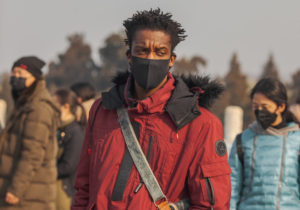
Some COVID-19 vaccines are showing positive signs of working, leading many to wonder who should get first access to a vaccine.
According to MarketWatch, the Centers for Disease Control and Prevention officials and an outside advisory committee are brainstorming the rollout of a COVID-19 vaccine. The agency is also considering giving priority access to the vaccine to several groups including key national security officials, high-risk individuals, and essential workers.
However, some are wondering if Black and Latino Americans, the most affected races, should get priority access. Philanthropist Melinda Gates, the wife of Microsoft co-founder Bill Gates, floated the idea in an interview with Time Magazine.
“In the U.S., that would be Black people next, quite honestly, and many other people of color. They are having disproportionate effects from COVID-19,” Gates told Time.
She added the next step would be to prioritize those with underlying conditions, older people, and essential workers. Black and Latino Americans have been getting infected and dying of COVID-19 at higher rates than White Americans.
In May, the NAACP launched the #WeAreDoneDying campaign to expose inequities in the healthcare system. A month later Dr. Anthony Fauci, director of the National Institute of Allergy and Infectious Diseases, admitted institutional racism is a contributing factor to the severe impact the virus has had on Black Americans.
Despite being a good idea, it doesn’t seem like giving priority access is an idea many are on board with. CDC spokeswoman Jasmine Reed wouldn’t commit to the idea.
“The ACIP board has created a work group to review data on COVID-19 vaccine candidates and consider a recommendation to CDC,” Reed told MarketWatch. “A portion of the group’s work will involve determining if there are priority groups that should get vaccinated based on occupation, risk of serious outcomes, and health disparities.”
Georges Benjamin, the executive director of the American Public Health Association and former secretary of the Maryland Department of Health and Mental Hygiene, said fast tracking a COVID-19 vaccine based on race and ethnicity could lead to the wrong groups being prioritized.
“It says that people are at risk because of their skin color, which isn’t the case—they’re at risk because they have public-facing jobs, chronic diseases, and other social determinants that put them at risk,” Benjamin said. “And we have to be very careful—this is not a Black disease. People should not be concerned about African Americans being more infectious than anybody else.”
Melody Goodman, the associate dean for research and an associate professor of biostatistics at the NYU School of Global Public Health, said the best method for a vaccine rollout is a strong educational campaign.
Many people still believe the virus is a hoax and showing a vaccine’s safety profile, side effects, and other positives will get more people to take the vaccine.
“We can make a great vaccine, but if we don’t have the community buy-in—people willing to take that vaccine—we actually don’t have a great vaccine,” Goodman said.
